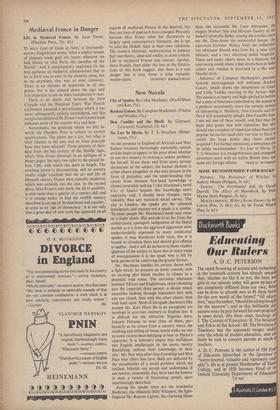New Novels
Don Camillo and the Devil. By Giovanni Guareschi. (Gollancz, 13s. 6d.) As the presence in England of Africans and West Indians becomes increasingly noticeable, serious articles begin to appear in the press about whether or not this country is creating a 'colour problem' for herself. From these, and from many private discussions of the subject, the human element is either absent altogether or else only present in the form of prejudice, and the understanding that comes from intimate first-hand knowledge is almost invariably lacking. Colin MacInnes's novel City of Spades imparts this knowledge more enjoyably and, I should have thought, more valuably than any statistical social survey. The city is London, the spades are the coloured immigrants and anyone not a spade is a jumble. To some people Mr. MacInnes's book may come as a slight shock. His attitude is as far from the embarrassed, apologetic indignation of the liberal jumble as it is from the aggrieved aggression most understandably expressed by many intellectual spades; it may disconcert both races, but it is bound to stimulate them and should give offence to neither. And it will do no harm to those readers ignorant of the subject to learn that in many cases of miscegenation it is the spade who is felt by both parties to be conferring the greater favour.
Mr. MacInnes handles his serious theme with a light touch; he presents an ironic comedy with an exciting plot which reaches its climax in a dramatic trial scene. The narration alternates between African and Englishman, twice retreating into the impartial third person; a device which resembles looking through binoculars first with one eye closed, then with the other closed, then with both open. Most of his spade characters (the earnest Mr. Karl Marx Bo is an exception) are involved in activities contrary to English law; it is difficult for the attractive Nigerian hero, Johnnie Fortune, to steer clear of these, par- ticularly as he comes from a country where the smoking and selling of hemp would strike no one as more vicious than indulging in beer or Player's cigarettes. It is Johnnie's charm that intrOduces two English intellectuals to the exotic society flourishing, without their knowledge, in their city : Mr. Pew who offers him friendship and Miss Pace who offers him love. Both are defeated by the complexities of a social problem which the resilient Johnnie can accept and understand, if not resolve; meanwhile, they have had the honour to meet a variety Of fascinating people, roost entertainingly described.
Among the spades there are the wonderful Bushman, the villainous Billy Whispers, the light- fingered Mr. Ronson Lighter, the charming Ham-
ilton, the successful Mr. Lord Alexander, the elegant Norbert Salt and Moscow Gentry of the Isabel Cornwallis Ballet; among the jumbles there are Mr. Zuss-Amor the resourceful lawyer, the equivocal barrister Wesley Vial, the vulnerable but obstinate Muriel who lives for a time with Johnnie, and a very alarming police inspector. These and many others move in a fantastic but convincing world where tribal drums beat in Soho cellars and voodoo is practised in a flat near Marble Arch.
Admirers of Compton Mackenzie's previous Scottish extravaganzas will welcome Rockets Galore, which shows the inhabitants of Great and Little Todday reacting to the Atomic Age, The mood is as hearty and high-spirited as before, but a note of bitterness (admitted by the author to a preface) occasionally sours the comedy instead of sharpening it. Similarly, Don Camillo and tke Devil will presumably delight Don Camillo fans; I am not one of these myself, and find that the
basic joke grows thin with repetition. But whY should one complain of repetition when these two popular favourites need only run true to form re satisfy the large public they have alreadY acquired? For further relaxation, a newcomer can
be safely recommended : No Law in Illyria, hY T. S. Stiachan, is a straightforward and competent adventure.story with an active British hero and


































 Previous page
Previous page